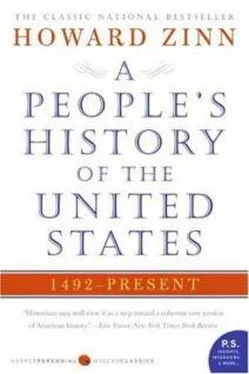Howard Zinn - A People
Здесь есть возможность читать онлайн «Howard Zinn - A People» весь текст электронной книги совершенно бесплатно (целиком полную версию без сокращений). В некоторых случаях можно слушать аудио, скачать через торрент в формате fb2 и присутствует краткое содержание. Издательство: Harper-Collins, Жанр: Фэнтези, на английском языке. Описание произведения, (предисловие) а так же отзывы посетителей доступны на портале библиотеки ЛибКат.
- Название:A People
- Автор:
- Издательство:Harper-Collins
- Жанр:
- Год:неизвестен
- ISBN:нет данных
- Рейтинг книги:4 / 5. Голосов: 1
-
Избранное:Добавить в избранное
- Отзывы:
-
Ваша оценка:
- 80
- 1
- 2
- 3
- 4
- 5
A People: краткое содержание, описание и аннотация
Предлагаем к чтению аннотацию, описание, краткое содержание или предисловие (зависит от того, что написал сам автор книги «A People»). Если вы не нашли необходимую информацию о книге — напишите в комментариях, мы постараемся отыскать её.
A People — читать онлайн бесплатно полную книгу (весь текст) целиком
Ниже представлен текст книги, разбитый по страницам. Система сохранения места последней прочитанной страницы, позволяет с удобством читать онлайн бесплатно книгу «A People», без необходимости каждый раз заново искать на чём Вы остановились. Поставьте закладку, и сможете в любой момент перейти на страницу, на которой закончили чтение.
Интервал:
Закладка:
Morris's plan was to give more assurance to those who had loaned money to the Continental Congress, and gain the support of officers by voting half-pay for life for those who stuck to the end. This ignored the common soldier, who was not getting paid, who was suffering in the cold, dying of sickness, watching the civilian profiteers get rich. On New Year's Day, 1781, the Pennsylvania troops near Morristown, New Jersey, perhaps emboldened by rum, dispersed their officers, killed one captain, wounded others, and were marching, fully armed, with cannon, toward the Continental Congress at Philadelphia.
George Washington handled it cautiously. Informed of these developments by General Anthony Wayne, he told Wayne not to use force. He was worried that the rebellion might spread to his own troops. He suggested Wayne get a list of the soldiers' grievances, and said Congress should not flee Philadelphia, because then the way would be open for the soldiers to be joined by Philadelphia citizens. He sent Knox rushing to New England on his horse to get three months' pay for the soldiers, while he prepared a thousand men to march on the mutineers, as a last resort. A peace was negotiated, in which one-half the men were discharged; the other half got furloughs.
Shortly after this, a smaller mutiny took place in the New Jersey Line, involving two hundred men who defied their officers and started out for the state capital at Trenton. Now Washington was ready. Six hundred men, who themselves had been well fed and clothed, marched on the mutineers and surrounded and disarmed them. Three ringleaders were put on trial immediately, in the field. One was pardoned, and two were shot by firing squads made up of their friends, who wept as they pulled the triggers. It was "an example," Washington said.
Two years later, there was another mutiny in the Pennsylvania line. The war was over and the army had disbanded, but eighty soldiers, demanding their pay, invaded the Continental Congress headquarters in Philadelphia and forced the members to flee across the river to Princeton- "ignominiously turned out of doors," as one historian sorrowfully wrote (John Fiske, The Critical Period), "by a handful of drunken mutineers."
What soldiers in the Revolution could do only rarely, rebel against their authorities, civilians could do much more easily. Ronald Hoffman says: "The Revolution plunged the states of Delaware, Maryland, North Carolina, South Carolina, Georgia, and, to a much lesser degree, Virginia into divisive civil conflicts that persisted during the entire period of struggle." The southern lower classes resisted being mobilized for the revolution. They saw themselves under the rule of a political elite, win or lose against the British.
In Maryland, for instance, by the new constitution of 1776, to run for governor one had to own 5,000 pounds of property; to run for state senator, 1,000 pounds. Thus, 90 percent of the population were excluded from holding office. And so, as Hoffman says, "small slave holders, non- slaveholding planters, tenants, renters and casual day laborers posed a serious problem of social control for the Whig elite."
With black slaves 25 percent of the population (and in some counties 50 percent), fear of slave revolts grew. George Washington had turned down the requests of blacks, seeking freedom, to fight in the Revolutionary army. So when the British military commander in Virginia, Lord Dunmore, promised freedom to Virginia slaves who joined his forces, this created consternation. A report from one Maryland county worried about poor whites encouraging slave runaways:
The insolence of the Negroes in this county is come to such a height, that we are under a necessity of disarming them which we affected on Saturday last. We took about eighty guns, some bayonets, swords, etc. The malicious and imprudent speeches of some among the lower classes of whites have induced them to believe that their freedom depended on the success of the King's troops. We cannot therefore be too vigilant nor too rigorous with those who promote and encourage this disposition in our slaves.
Even more unsettling was white rioting in Maryland against leading families, supporting the Revolution, who were suspected of hoarding needed commodities. The class hatred of some of these disloyal people was expressed by one man who said "it was better for the people to lay down their arms and pay the duties and taxes laid upon them by King and Parliament than to be brought into slavery and to be commanded and ordered about as they were." A wealthy Maryland land- owner, Charles Carroll, took note of the surly mood all around him:
There is a mean low dirty envy which creeps thro all ranks and cannot suffer a man a superiority of fortune, of merit, or of understanding in fellow citizens-either of these are sure to entail a general ill will and dislike upon the owners.
Despite this, Maryland authorities retained control. They made concessions, taxing land and slaves more heavily, letting debtors pay in paper money. It was a sacrifice by the upper class to maintain power, and it worked.
In the lower South, however, in the Carolinas and Georgia, according to Hoffman, "vast regions were left without the slightest apparition of authority." The general mood was to take no part in a war that seemed to have nothing for them. "Authoritative personages on both sides demanded that common people supply material, reduce consumption, leave their families, and even risk their lives. Forced to make hard decisions, many flailed out in frustration or evaded and defied first one side, then the other…"
Washington 's military commander in the lower South, Nathanael Greene, dealt with disloyalty by a policy of concessions to some, brutality to others. In a letter to Thomas Jefferson he described a raid by his troops on Loyalists. "They made a dreadful carnage of them, upwards of one hundred were killed and most of the rest cut to pieces. It has had a very happy effect on those disaffected persons of which there were too many in this country." Greene told one of his generals "to strike terror into our enemies and give spirit to our friends." On the other hand, he advised the governor of Georgia "to open a door for the disaffected of your state to come in…"
In general, throughout the states, concessions were kept to a minimum. The new constitutions that were drawn up in all states from 1776 to 1780 were not much different from the old ones. Although property qualifications for voting and holding office were lowered in some instances, in Massachusetts they were increased. Only Pennsylvania abolished them totally. The new bills of rights had modifying provisions. North Carolina, providing for religious freedom, added "that nothing herein contained shall be construed to exempt preachers of treasonable or seditious discourses, from legal trial and punishment." Maryland, New York, Georgia, and Massachusetts took similar cautions.
The American Revolution is sometimes said to have brought about the separation of church and state. The northern states made such declarations, but after 1776 they adopted taxes that forced everyone to support Christian teachings. William G. McLoughlin, quoting Supreme Court Justice David Brewer in 1892 that "this is a Christian nation," says of the separation of church and state in the Revolution that it "was neither conceived of nor carried out…. Far from being left to itself, religion was imbedded into every aspect and institution of American life."
One would look, in examining the Revolution's effect on class relations, at what happened to land confiscated from fleeing Loyalists. It was distributed in such a way as to give a double opportunity to the Revolutionary leaders: to enrich themselves and their friends, and to parcel out some land to small farmers to create a broad base of support for the new government. Indeed, this became characteristic of the new nation: finding itself possessed of enormous wealth, it could create the richest ruling class in history, and still have enough for the middle classes to act as a buffer between the rich and the dispossessed.
Читать дальшеИнтервал:
Закладка:
Похожие книги на «A People»
Представляем Вашему вниманию похожие книги на «A People» списком для выбора. Мы отобрали схожую по названию и смыслу литературу в надежде предоставить читателям больше вариантов отыскать новые, интересные, ещё непрочитанные произведения.
Обсуждение, отзывы о книге «A People» и просто собственные мнения читателей. Оставьте ваши комментарии, напишите, что Вы думаете о произведении, его смысле или главных героях. Укажите что конкретно понравилось, а что нет, и почему Вы так считаете.












